I've often compared this era in American politics with previous eras, most notably the Antebellum period from Jackson on. Yale historian Joanne Freeman zeroes in on 1850—at least as far as our representatives' behavior in Congress
Although couched in calls for unity, [Republican] warnings are remarkably one-sided. There is no talk of reconciliation or compromise. No acceptance of responsibility. Lots of blame casting. And little willingness to calm and inform their base. Even now, some Republicans refuse to admit that Joe Biden won the election, and the Senate vote on an impeachment trial on Jan. 26 suggests that most Republicans want no investigation and will place no blame. They want reconciliation without apologies, concessions without sacrifice, power without accountability.
This is bullying as politics, the modus operandi of our departed chief. Hardly a Trumpian innovation, its heyday was in the decades before the Civil War. During the 1840s and 1850s, America was divided over the fate of slavery. Political parties were splintering under the strain. National institutions were struggling — and failing — to contain it. The press sensationalized the struggle to serve a cause and sell papers.
Southerners had long dominated the national government, and they felt entitled to that power. They were also worried about losing it, a product of the rise of abolitionism and potentially free states forming in the West. Viewing their violence as defensive and justifiable, they fended off attacks on slavery with force when necessary, demanding compliance or silence from their foes, and sometimes getting it.
For some Southerners, this brand of politics wasn’t much of a stretch; their slave regime was grounded in violence, and mastery was their way of life. Between 1830 and 1860, there were at least 70 violent incidents on the House and Senate floors, most of them prompted by Southerners.
With the centuries-long history of Southern white politicians advocating for Southern white minority power, does their behavior today surprise anyone? Freeman concludes:
It needs to assert the power of democratic institutions and the rule of law with a comprehensive investigation into the attack and punishment of its enablers, not in a spirit of revenge, but justly, fairly and consistently. It’s stunning that it needs to be said, but it must be: People who stage, support, or incite violent attacks on the federal government — whether they’re American citizens, members of Congress or the president himself — should be held accountable, not only to restore order in the present, but to fend off similar attacks in the future. Uniting the nation requires no less.
Yes. Lest we find ourselves lurching through the 1850s again. We all know how that ended.
Annalee Newitz, author of Four Lost Cities, explains that urban collapse doesn't look anything like dystopian fiction would have it:
It’s always lurking just around the corner, seductive and terrifying, but it never quite happens. Lost-city anxieties, like the ones aroused by the pandemic, result from a misunderstanding of what causes cities to decline. Pandemics, invasions, and other major calamities are not the usual culprits in urban abandonment. Instead, what kills cities is a long period in which their leaders fail to reckon honestly with ongoing, everyday problems—how workers are treated, whether infrastructure is repaired. Unsustainable, unresponsive governance in the face of long-term challenges may not look like a world-historical problem, but it’s the real threat that cities face.
This slow-motion catastrophe—a combination of natural disaster and political indifference—was far more important to [Angkor's] transformation than the Ayutthaya invasion [in 1431]. And it stands as a warning to many cities in the U.S. Without a coherent response from local government, cities lashed by climate change will gradually lose their populations. The demise won’t be spectacular, even if the storms are monstrous. Instead, people will leave in dribs and drabs, and the exodus could take generations.
So, I'm going to stay in Chicago, which will likely remain a thriving urban center for hundreds more years.
It's pretty, though:
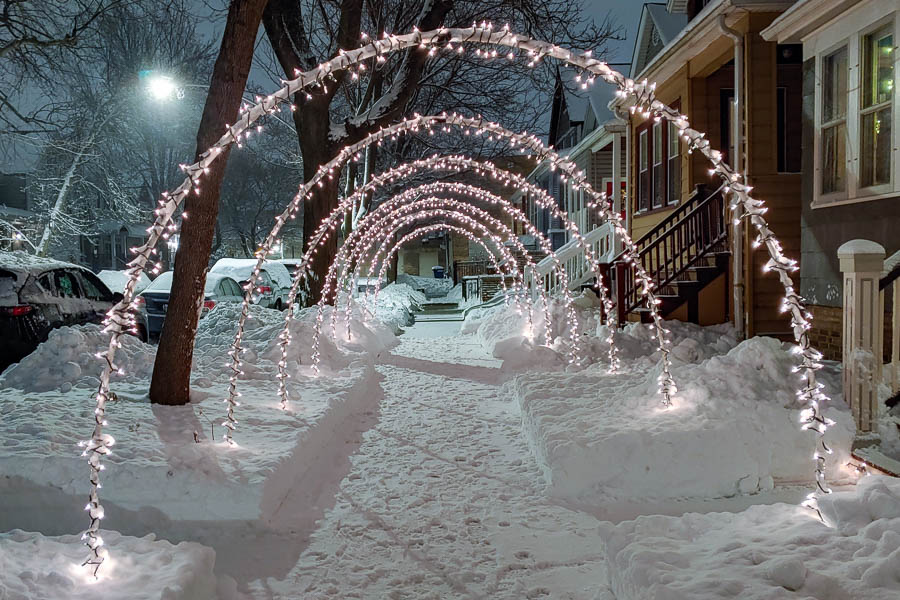
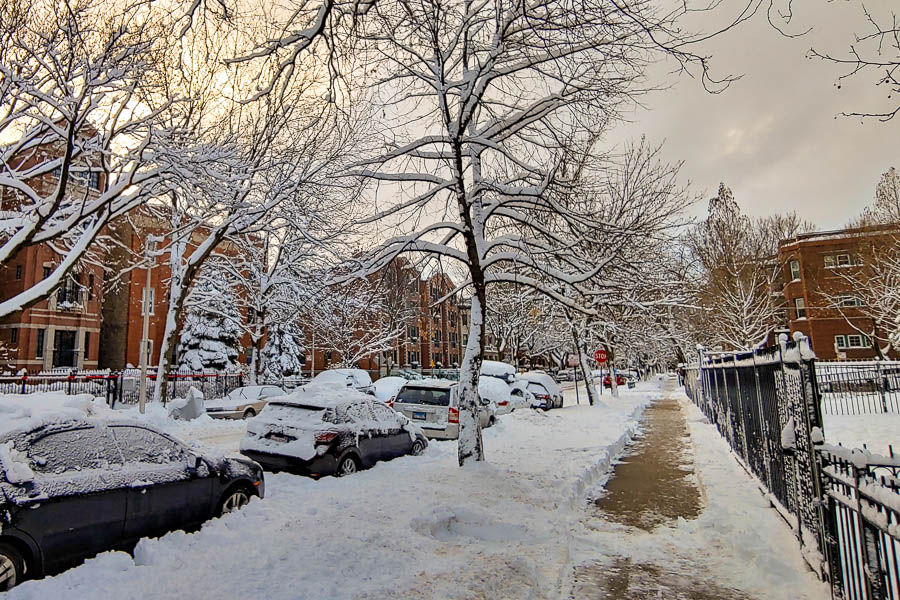
And today, we've even got sunlight. Happy February.
I also had a houseguest last night, who has made a thorough job of covering my couch with hair:

Thanks, Sophie.
On this day in 2011, Chicago got so much snow it shut down the city for almost 48 hours. So it's fitting we're having the biggest snowfall of the winter so far right now:
With 241 mm of snow recorded at the National Weather Service office in Romeoville and 173 mm at O’Hare International Airport as of Sunday morning, the city officially logged its second storm this week with more than 150 mm of snow — something that hasn’t happened since January 2014, officials said.
The heaviest period of snowfall was between 8 p.m. Saturday and 3 a.m. Sunday, according to meteorologists. Visibility during that time was reduced to less than 400 m during much of that time, with snow falling at a rate of an 25 mm an hour or faster, according to the weather service.
The Tribune published that around 9am; as of noon, O'Hare's snowfall reached 330 mm. They also have some photos for those of you who live in climates that have no interesting variations to gawk at. Here's my neighborhood:
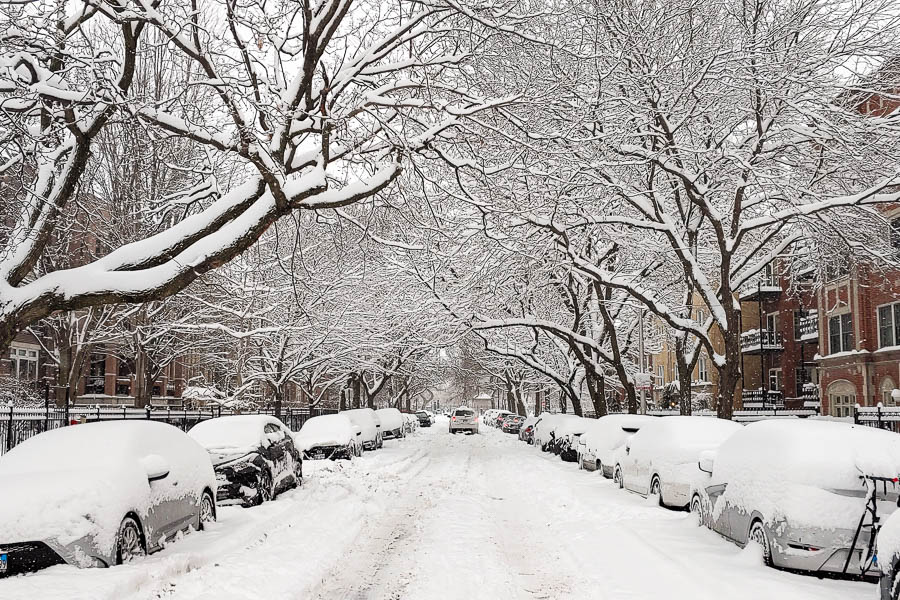
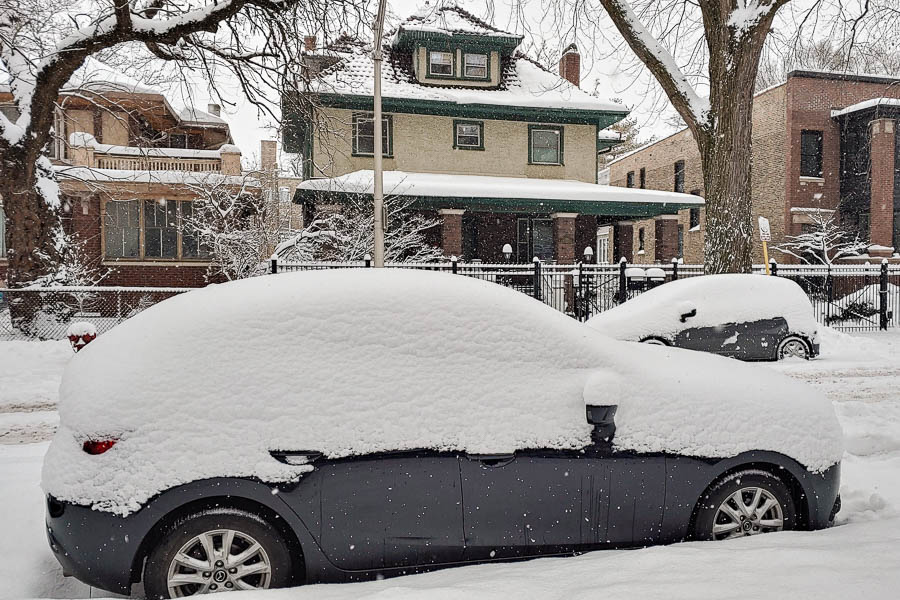
And it's still coming down. Which means it's a perfect day to go to a warm (-ish, they still have to keep doors open) brewery and read for a bit. Because, dammit, I will get my 10,000 steps today.
A 25-meter section of the Pacific Coast Highway slid into the Pacific about 30 km south of Big Sur this week:
Caltrans spokesperson Jim Shivers said the damage to the highway is called a slip out. "It's where we lose a part of the highway and now we're facing a project to clean and repair that stretch," Shivers said. "This is the only location we're aware of where this happened in the storm. Our maintenance team is patrolling the highway now to look for other damage."
The closure is in Rat Creek between MPM 40 and the San Luis Obispo county line, the California Highway Patrol said.
A common phenomenon called an "atmospheric river" delivered half a meter of rainfall to the region last week. CA-1 has a history of sliding into the ocean; for example, the area just south of Pacifica, Calif., known as "Devil's Slide" collapsed so frequently that that Caltrans bored two 1200-meter tunnels through solid rock from 2005 to 2013 to keep the road open.
Fox News has a habit of hiring the XPOTUS's press secretaries (even when no one else will), for a very simple reason:
The appeal of all four to a network like Fox News is that, more than any cluster of unprofessionals in former president Donald Trump’s orbit, his former press secretaries have the most experience in covering up, promoting and articulating lies. Fox News hired [Sarah] Sanders, for instance, just months after the Mueller report showed she lied about alleged support within the FBI for the May 2017 firing of then-FBI Director James B. Comey. [Kayliegh] McEnany carried forward the tradition of disinformation stemming from the Trump White House, most egregiously in the final two months of her tenure, as she pushed specious report after specious report in service of the lie that the election had been stolen from her boss.
Meanwhile, current White House Press Secretary Jen Psaki will appear on tomorrow's Wait Wait...Don't Tell Me! on NPR, after giving almost a dozen mercifully boring and accurate press briefings. It's so delightful I could cry.
I'm having a series of productive days lately, which has taken me away from wasting a bunch of time. So for example, I haven't yet today read these items:
And all of this on the coldest day in two years, in a month in which most days have had no sunlight. But hey, we're still having an abnormally-mild winter, so again, we're not complaining.
As the State of Illinois starts abandoning the Helmut Jahn-designed Thompson Center in Chicago's Loop, the Governor's Office announced the state has purchased PepsiCo's old building at 555 W Monroe St:
The 18-year-old structure has 430,000 square feet of office space and has green certification for energy efficiency.
More than 1,000—and potentially 1,400—of the 3,500 state workers now based in downtown Chicago eventually will relocate to the new facility, starting in April, according to Ayse Kalaycioglu, chief operating officer of the Illinois Department of Central Management Services, which manages the state’s real estate needs.
About 900 of the employees moving to 555 W. Monroe will be coming from the Thompson Center, leaving 1,300 in the structure named after the named the former governor who championed its construction and mourned its declining fortunes. But they won’t be there long, said Kalaycioglu and Deputy Gov. Dan Hynes in an interview late yesterday.
I'm sorry to hear so many people calling the Thompson Center "so old" and "dilapidated" given it opened in 1984 and sits directly across the street from the century-old City Hall. But: "In comparison, the state says the Thompson Center has $325 million in deferred maintenance needs now, a figure projected to grow to $525 million by 2026." (I took the below photo about a year after it opened.)
The other story is that seven new pizza places have recently opened in the city, and I may have to try a few of them. That square of Bill's Original Tavern Pizza at the top of the article made me hungry.

It's every other Tuesday today, so I'm just waiting for the last continuous-integration (CI) build to finish before deploying the latest software to our production environment. So far, so boring, just the way I like it. Meanwhile, in the real world:
- In a symbolic but meaningless vote, all but 5 Republican members of the US Senate voted to let the XPOTUS off the hook for inciting an insurrection against, well, them, as this way they believe they get to keep his followers at no cost to themselves. If this past year were a novel, the next sentence might begin with "Little did they know..." Which, you know, describes those 45 Republicans to a T.
- Dutch police arrested more than 180 people in Amsterdam and Rotterdam for rioting against Covid-19 lockdowns: "A leading Dutch criminologist, Henk Ferwerda, said the riots involved 'virus deniers, political protesters and kids who just saw the chance to go completely wild – all three groups came together.'"
- Air travelers across the US can rejoice that CNN Airport News will go away on March 31st.
- Over 1 teratonne of ice melted over each of the past few years, increasing concerns about global sea level rises.
- Two mathematicians argue that time-travel paradoxes don't exist, because the universe routes around them.
Finally, snow continues to fall in Chicago, so far accumulating to about 100 mm by my house and as of noon about 125 mm at O'Hare. Calling this a "snowstorm" seems a bit over the top as it's coming down at under 10 mm per hour and forecast to stop before too long. Plus it's barely below freezing for now—but forecast to cool down to -11°C by Wednesday night before creeping above freezing Friday and Saturday. So we might have a blanket of snow for a bit. Still, it's the most snow we've gotten all season, with less than 5 weeks to go before meteorological spring starts March 1st. I'm OK with this mild winter, though it might presage a very hot summer.
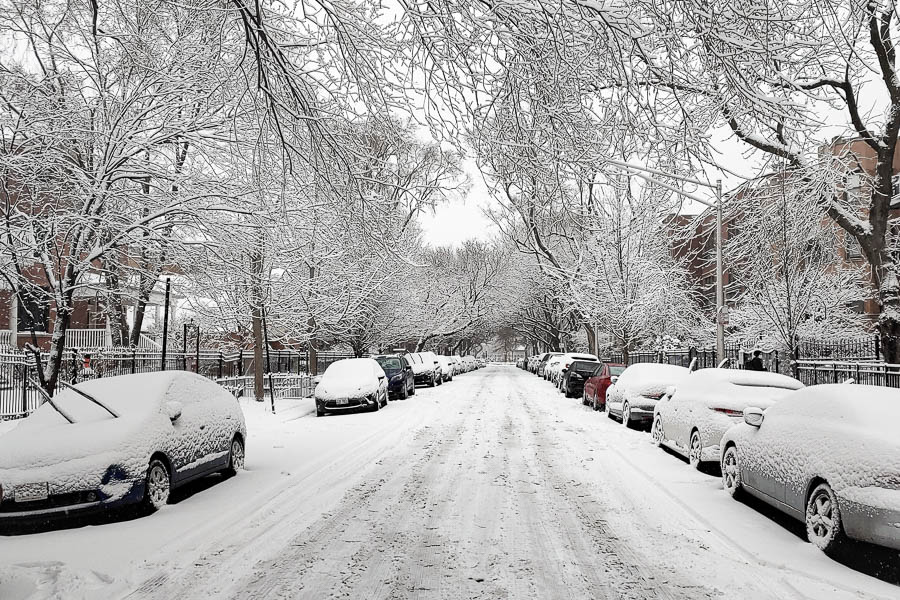
Dear future reader, observe how the combination of physical isolation; near-universal access to the entire world through the Internet; apps that make collaboration simple (like TikTok); and really bored young people has allowed entirely new art forms to flourish. This, as just one example, needs preservation so future generations can see what we got up to in early 2021:
I don't know whether videos like this will continue once people can make live music for live audiences again. I will predict, however, that movies made in the 2040s and 2050s will use a few seconds of a TikTok sea shanty to set the stage in the same way that a few notes of "Mister Sandman" instantly tells today's audiences that the story takes place in the 1950s.